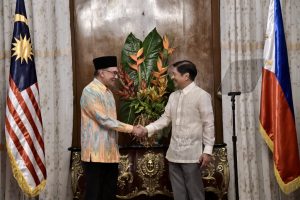Malaysian Prime Minister Anwar Ibrahim said yesterday that more than 200,000 refugees from Myanmar have now sought asylum in his country, as he called for fresh action to push the country’s ruling military clique to implement an Association of Southeast Asian Nations (ASEAN) peace plan.
Anwar made the comments while on a state visit to the Philippines, during which he and President Ferdinand Marcos Jr. signed a number of bilateral agreements and discussed several regional and international issues of note, including the ongoing disputes in the South China Sea.
The Myanmar crisis was reportedly high on the agenda. During a joint press conference following his meeting with Marcos, Anwar said that he expressed his “concern” about the “contentious, unresolved Myanmar issue which is affecting Malaysia adversely due to the huge number of refugees exceeding 200,000 people now in Malaysia,” Anwar said in a press conference following his meeting with Marcos.
In recent years, Malaysia has been one of the primary destinations for those fleeing Myanmar, particularly Rohingya Muslims who have undertaken highly dangerous ocean voyages from the coasts of Myanmar and Bangladesh. The arrivals have continued since the military’s disastrous seizure of power in February 2021, which has sparked a nationwide conflict that shows no signs of abating.
According to the United Nations refugee agency, there were around 183,790 refugees and asylum-seekers registered with the agency in Malaysia as of the end of January, more than 158,000 of which were from Myanmar. Of these, 106,500 were Rohingyas, 23,450 were Chins, and 28,920 belonged to other ethnic minority groups “from conflict-affected areas or fleeing persecution in Myanmar.”
During his press conference with Anwar, Marcos reiterated the need for the implementation of the Five-Point Consensus, an ASEAN peace plan that calls for an immediate end to the violence in Myanmar and inclusive political dialogue involving “all parties” to the country’s multifarious conflict. Anwar added that the regional bloc had to find new ways for persuading the military junta “to work and collaborate as a team with the ASEAN and resolve the outstanding issues.”
How exactly it might do this, short of abandoning the Five-Point Consensus and adopting a punitive measure, is hard to see. The military administration in Myanmar has shown no intention of implementing the agreement, paying it lip service while increasing its attacks on resistance forces. Indeed, even the lip service may be on the way out. Last week, an unnamed junta foreign affairs official was quoted by state media as saying that the emergency summit in Indonesia at which the Five-Point Consensus was agreed was “informal” and that the consensus was not “legally binding.”
Vague though they were, Anwar’s comments seem to suggest that Malaysia will continue to claim a leading role in the Myanmar conflict within ASEAN. Over the past two years, Malaysian officials have been unusually forthright in their condemnations of the military administration in Naypyidaw and have advocated more muscular regional action to resolve or moderate the conflict. Former Foreign Minister Saifuddin Abdullah even suggested that the Five-Point Consensus could be scrapped, should the military junta continue to stonewall ASEAN on its implementation.
At the same time, the country’s outspokenness has been countered by the increasingly unsentimental line that its immigration authorities have taken toward Myanmar nationals seeking sanctuary in Malaysia. In October, the advocacy group Human Rights Watch claimed that the country had returned more than 2,000 Myanmar nationals since April of last year, including military defectors, “without assessing their asylum claims or other protection needs.” Two other rights groups reported that Malaysia deported an additional 114 people in January, an action that Amnesty International said “exposes the government’s hypocrisy in policy and practice.”
All the same, Malaysian concerns about how it is being directly impacted by the conflict, in terms of a mounting toll of refugee arrivals, only give it more reason to try to maneuver the conflict in the direction of some sort of resolution.

































